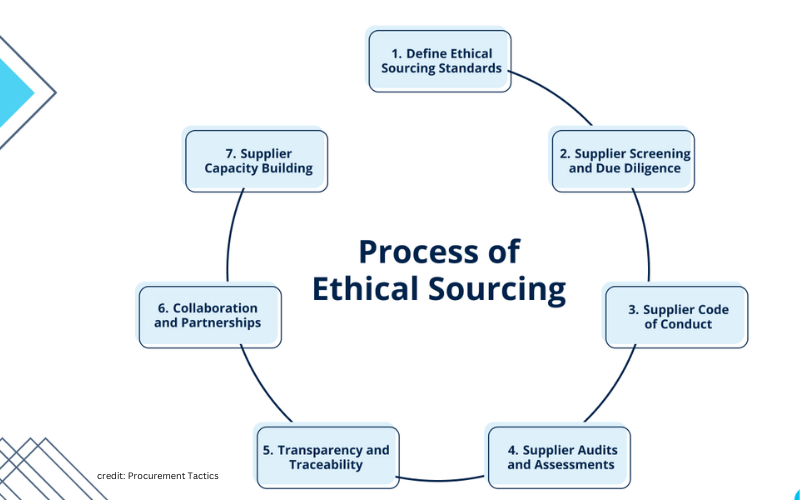In the vast and ever-expanding landscape of e-commerce, ethical sourcing stands out as a cornerstone for sustainable business practices. This comprehensive guide dives deep into the nuances of ethical sourcing within the e-commerce industry, highlighting why it’s not just beneficial but essential for businesses aiming to thrive in today’s market. With a focus on practical strategies, this article will equip you with the tools and insights needed to implement and benefit from ethical sourcing practices.
Why Ethical Sourcing Matters in E-commerce
In an age where consumers are more conscious than ever about the impact of their purchases, e-commerce businesses face a significant opportunity to lead with values. Ethical sourcing—securing goods in a responsible and sustainable manner—addresses critical aspects of environmental, social, and economic sustainability, fostering a positive brand image and building customer trust.
The Business Case for Ethical Sourcing
- Enhanced Brand Loyalty: Customers are increasingly loyal to brands that commit to sustainability.
- Risk Mitigation: Ethical sourcing reduces risks associated with environmental regulations and labor violations.
- Market Differentiation: Stand out in a crowded market by committing to responsible practices.
Understanding Ethical Sourcing
Defining Ethical Sourcing
- Broad Spectrum: Ethical sourcing covers everything from labor conditions to environmental impact and economic fairness.
- Compliance and Beyond: It’s not just about meeting legal standards but exceeding them to protect the planet and its people.
The Key Components of an Ethical Sourcing Program
- Supplier Audits: Regular checks to ensure suppliers meet ethical standards.
- Certifications and Standards: Leveraging established frameworks like Fair Trade to guide sourcing decisions.
- Transparency: Open communication about sourcing practices with customers and stakeholders.
Implementing Ethical Sourcing in Your E-commerce Strategy
Starting with Supplier Selection
- Vetting Suppliers: Criteria for choosing suppliers who align with ethical practices.
- Building Relationships: Partnering with suppliers for long-term collaboration on sustainability goals.
Integrating Technology
- Supply Chain Transparency Tools: Technologies that track and verify the ethical credentials of suppliers.
- Data Analytics: Using data to monitor supply chain performance against ethical standards.
Challenges and Solutions in Ethical Sourcing
Navigating the Complexity of Global Supply Chains
- Complexity: Managing multiple suppliers across different countries each with its own set of challenges and regulations.
- Solutions: Implementing centralized management systems to monitor compliance and performance.
Cost Implications
- Perceived Higher Costs: Ethical sourcing can be seen as a costlier approach initially.
- Long-Term Benefits: Discussing how sustainable practices lead to greater efficiency and lower costs over time.
Case Studies: Success Stories in Ethical E-commerce
- Company Profiles: Examples of e-commerce businesses that have successfully integrated ethical sourcing into their operations.
- Lessons Learned: Key takeaways from these businesses that can guide new adopters of ethical sourcing.
Future Trends in Ethical E-commerce
Innovations Leading the Way
- Emerging Technologies: Blockchain for transparency, AI for supplier audits.
- Consumer Trends: Increasing demand for ethically sourced products as a standard practice.
Conclusion: The Ethical Path Forward
Adopting ethical sourcing isn’t just a moral choice; it’s a strategic business decision that aligns with both consumer demand and long-term sustainability. By embracing ethical practices, e-commerce businesses not only contribute to global well-being but also position themselves as leaders in a future where sustainability is expected, not just appreciated.
Actionable Tips:
- Educate Your Team: Ensure that everyone in your organization understands the importance and principles of ethical sourcing.
- Engage with Stakeholders: Regularly communicate with your customers about your ethical sourcing efforts and their benefits.
- Continuous Improvement: Always look for ways to enhance your sourcing strategies as technologies and markets evolve.

